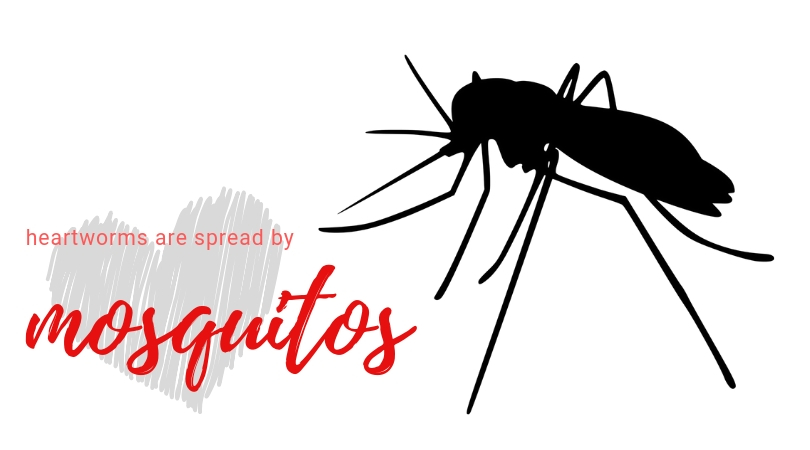We are so proud of pet owners who take such loving care of their family members. They buy good quality food, keep their dogs and cats clean and sheltered, and protect them from infectious diseases. But many owners are still unaware of the dangers of heartworm disease, a leading cause of pet illness and death in many areas of the country.
Heartworms are long spaghetti-like worms that live in the hearts of dogs and a smaller number of cats and ferrets. They are spread by infected mosquitos. They can affect our pets all year long, but whenever the outdoor temperature is up, our pets are at increased risk.
Dogs and Heartworms
Dogs are the primary animal heartworms attack. The mosquito bites an infected dog (or coyote or other canine species). It ingests hundreds to thousands of larvae (babies) of the heartworm. These larvae then mature inside the mosquito to their next life stage, ready to infect a new dog. The mosquito then bites your dog, injecting large numbers of microscopic larvae. At this point, the larvae are vulnerable to preventative medications, and if your dog is protected, the larvae are harmlessly eliminated. However, if your dog is not protected, the larvae mature again within 4 weeks and are no longer susceptible to preventative medications. Now they migrate to the heart, where they attach and grow, slowly filling up the right chambers of the heart and trailing into the vessels of the lungs. After 6 months they begin to produce new baby larvae of their own, and the cycle starts all over again.

On the outside, the dog doesn’t show any evidence of the damage slowly happening to its heart and lungs. It can secretly carry the parasite for a few years before changes become obvious. But in the heart and vessels, the worms are causing remodeling, scarring, and inflammation. Eventually, most dogs develop a cough, weight loss, and distended abdomen; unfortunately the infestation also eventually leads to death. Sometimes the dogs even die acutely if a piece of worm breaks loose and acts as an embolism, blocking blood flow to another vital organ, or the heart develops arrhythmia or other failures. These dogs are high anesthetic risks and do not tolerate stress and exercise.
Protecting Your Dog
 We recommend three measures to protect your dog from ever developing heartworm infections. First, there are multiple types of preventative medications they can take, ranging from tasty treats they eat once a month, to spot on treatments, and even injections. These medicines are perfectly safe for the dog at the dose formulated and can be taken every month for the dog's entire life¹. These medicines, to work, must be in the dog’s system when the dog is exposed to the infected mosquito.
We recommend three measures to protect your dog from ever developing heartworm infections. First, there are multiple types of preventative medications they can take, ranging from tasty treats they eat once a month, to spot on treatments, and even injections. These medicines are perfectly safe for the dog at the dose formulated and can be taken every month for the dog's entire life¹. These medicines, to work, must be in the dog’s system when the dog is exposed to the infected mosquito.
The second measure is yearly heartworm testing. Even the most dedicated owner may miss a dose. Studies have shown that a small percentage of dogs have missed, spit out, and/or failed to absorb a dose of preventative every year. As such, most veterinarians run a yearly blood test to be sure the dog is maintaining a heartworm negative status. It allows them to intervene with the treatment of an unexpected infection before serious damage occurs.
The final and most difficult measure is trying to minimize mosquito exposure. At this time, there are very few mosquito repellants available for dogs.² Limiting time outside during dusk and dawn and treating the premises where the dog stays can help.
Treating Heartworm Infection
In the unfortunate event that a dog gets a heartworm infection, there is a treatment available. The patient’s overall health status and amount of change in the heart is evaluated with a physical exam, bloodwork, and X-rays. A course of antibiotics (which weakens the worms), steroids, and a cautious introduction of preventative medicine (to stop any more worms getting started)³, is started for 8-12 weeks. After the worm has been weakened and the dog stabilized, a series of injections given at the beginning and end of a 4 week period is started. The dog must be restrained to leash walks and cage confinement to minimize the risks of embolisms during this entire period plus 4 weeks after the last shot.
The treatment is highly effective at drastically lowering and usually eliminating the parasites, but the limited activity can be tough on young energetic dogs and their owners. In addition, the treatment has risks, and a small number of dogs become severely ill as the worms are eliminated. Finally, the treatment can be very expensive. So, prevention is by far the more preferable method to keep a dog safe.
Heartworms in Cats and Ferrets
A quick note on cats and ferrets. Both species are not natural hosts for heartworms and tend to repel the larvae when bitten by infected mosquitos. However, it is possible for the worms to survive the animal’s defenses and establish themselves in the heart. In cats, this may cause a brief episode of coughing and occasional vomiting, and it will cause some drastic, but subclinical (not evident in the cats outward appearance) changes to blood vessels. Both host and parasite live without obvious distress until the parasite dies a natural death. The ensuing inflammatory reaction on the part of the cat is disastrous, acute, and usually fatal. In a matter of hours, the kitty progresses from a seemingly normal kitty to a state of collapse, gasping for breath. The best chance for survival is an immediate and intense steroid and oxygen therapy. Unfortunately, indoor-only living does not prevent cats from encountering infected mosquitoes. About 30% of cats that become infected were indoor only.

The tests for heartworms in cats can be misleading and often show negative results even when the kitty is positive for parasites. There is NO treatment for cats if we are able to determine an infection exists. However, if we know heartworms are present, you are able to recognize and provide any veterinarian the necessary information if a crisis happens.
The good news is there are a few preventatives to use in cats, usually included with flea prevention, and the incidence of heartworm infections is very low.
Prevention for your Cat and Ferret
So while this is not a condition for you to lose sleep over, putting your cat on prevention is a wise move. Ferrets experience heartworms similarly to cats. We would advise you to seek advice from an exotic animal veterinary specialist if you own a ferret.
So in conclusion, all dogs in most areas of the United States, but especially warm moist climates favorable to mosquitoes, need to be on heartworm preventative year round. The disease is rampant in those areas, expensive to treat, and dangerous to ignore. Cats and ferrets also benefit from heartworm protection, while the incidence is much lower, the danger is even greater.
Schedule an appointment to diagnose or prevent heartworms in your pet.
Footnotes:
¹Most dogs can eat many times the recommended dose of a preventative. The exception is among herding breeds which can safely take the prescribed amount but can overdose if multiple doses are accidentally given (such as the dog grabs the box off the counter and eats the whole box).
²Vectra is a spot on product available in some offices that promotes its ability to repel mosquitoes. It cannot be relied upon for complete heartworm protection.
³On rare occasions heartworm preventatives can create some side effects when given to an infected dog. Prevention should never be started in dogs of unknown heartworm status, and only given when the owner is present for several hours to observe the dog, preferably when they have access to their veterinarian.
